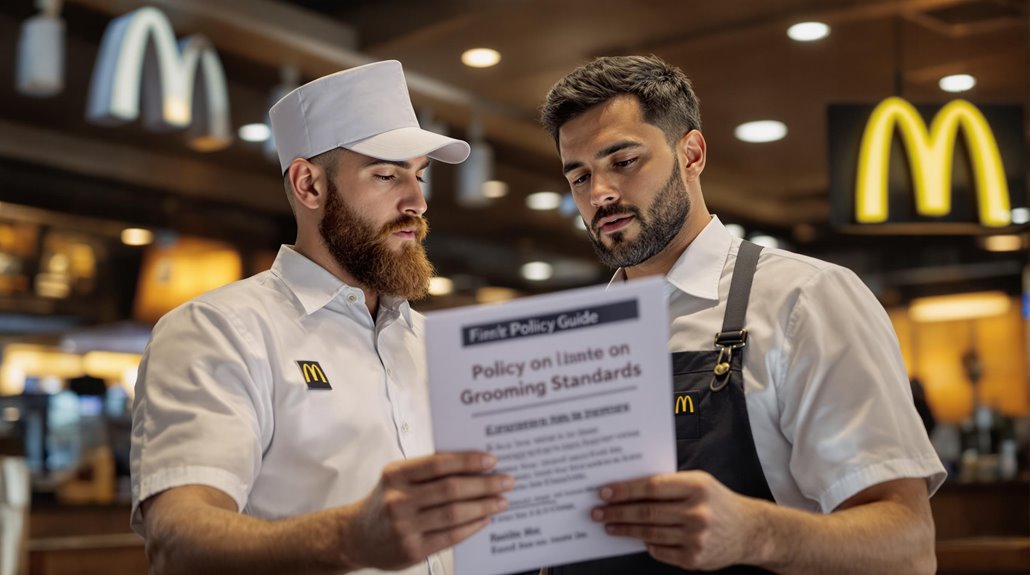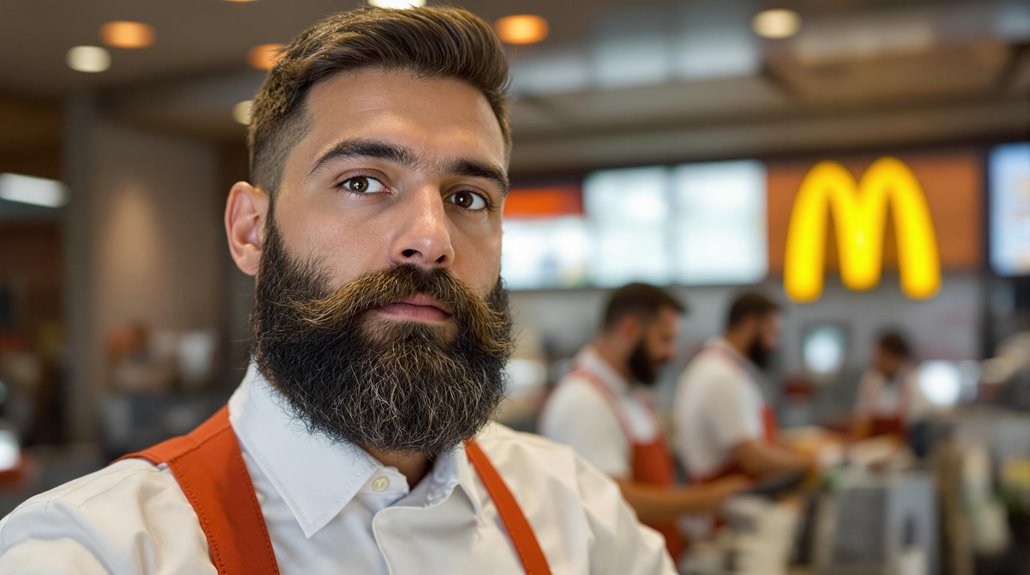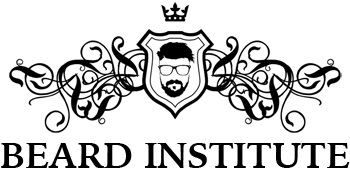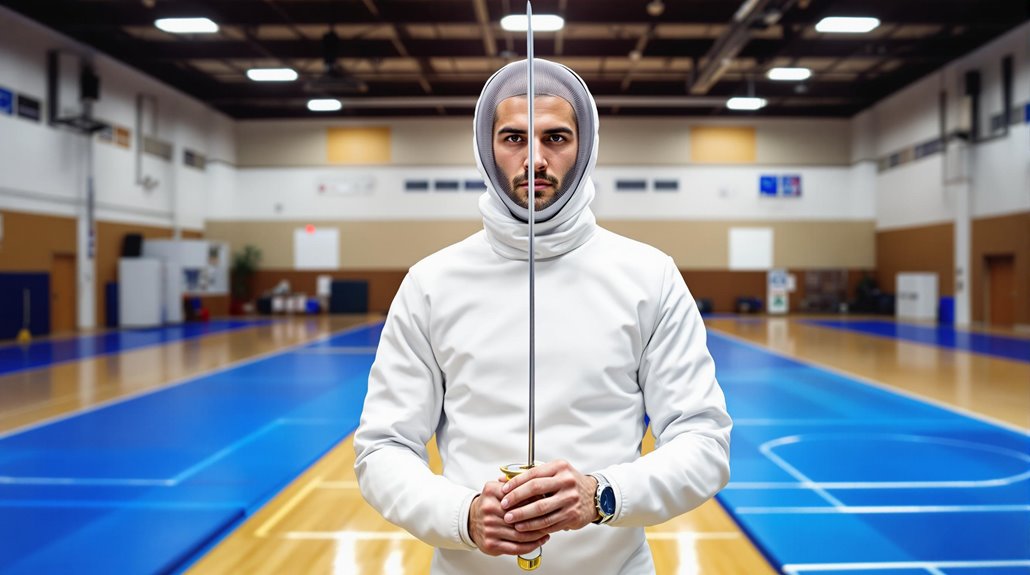Does Mcdonald's Allow Beards?

Yes, McDonald's allows beards, but you'll need to follow their grooming standards. Beards must not exceed 15mm unless you're exempted for religious or medical reasons, with the proper documentation. If your beard is longer, you must wear a beard snood to maintain hygiene and safety in food prep areas. Each exception request is individually reviewed by management to guarantee they respect cultural and religious beliefs. McDonald's enforces these standards through regular inspections and may take disciplinary actions if guidelines aren't met. Curious about how policies accommodate personal expression and religious beliefs? There's more to investigate.
Overview of McDonald's Beard Policy
Even though McDonald's maintains a clean-cut image, they do allow beards under specific circumstances. As an employee, you can have a beard if you meet certain criteria, such as for religious reasons. This means if your faith requires you to grow a beard, McDonald's is willing to accommodate. However, there's a process to guarantee that your beard doesn't compromise hygiene and safety in food production.
To qualify for an exception, you need to provide documentation supporting your religious reasons. Each request is reviewed individually by management, and if approved, you must adhere to strict guidelines. One of these guidelines is wearing a beard snood or net at all times if your beard is longer than 15mm. This is vital to prevent any hair contamination while you're handling food.
Regular inspections are part of the policy to maintain compliance. If you're found not following the beard policy, you might face disciplinary action. So, it's significant to always have your documentation updated and verify you're properly wearing your snood. In general, while the rules are strict, McDonald's does aim to respect and accommodate personal and religious beliefs whenever possible.
Beard Length and Grooming Standards
To maintain a hygienic environment, McDonald's enforces strict grooming standards for employees with beards. If your beard is part of your religious beliefs, you're allowed to keep it, but you'll need to follow specific guidelines. Beards can't exceed 15mm in length, and if they do, they must be contained within a beard snood or net. This rule guarantees that all facial hair is kept securely away from food products, maintaining the quality and safety of what customers eat.
Here's what you need to remember:
- Regular Checks: McDonald's conducts regular inspections to confirm everyone complies with the grooming standards. If your beard isn't up to snuff, you might be asked to adjust it.
- Precise Measurement: Your beard length is measured from the skin to the tip. If it doesn't fit within a snood or net, you can't wear it while working.
- Religious Considerations: While McDonald's respects religious beliefs, maintaining a clean environment is essential. Even for religious beards, adherence to these grooming rules is non-negotiable.
Importance of Beard Snoods
In maintaining McDonald's grooming standards, beard snoods play a significant role, guaranteeing both hygiene and safety in the fast-food environment. If you have a beard longer than 15mm, wearing a beard snood is mandatory to prevent hair from contaminating the food. This requirement isn't just a suggestion; it's essential for maintaining the cleanliness and safety of the food you help prepare.
You must securely contain all facial hair with the snood, as non-compliance can pose serious safety risks. Regular inspections are conducted to verify everyone's following the beard snood policy, emphasizing the importance of hygiene in this setting. If you fail to wear a beard snood when required, you could face disciplinary action. This underscores the balance McDonald's seeks between allowing personal grooming choices and upholding food safety standards.
There are designated styles and materials for beard snoods that align with company standards, yet they still accommodate personal expression. By adhering to these guidelines, you contribute to a safe and hygienic environment, which is vital in fast-food service. Always remember, your compliance not only protects the food but also upholds the restaurant's reputation.
Exceptions in Facial Hair Policy
At McDonald's, not all facial hair policies are set in stone; some exceptions allow for beards when justified by religious, cultural, or medical reasons. If you're seeking an exemption, you'll need to provide proper documentation. This step guarantees that the company respects your beliefs while maintaining its standards. Each request is reviewed individually, so it's significant to present clear and convincing evidence.
Here are some reasons that might evoke a sense of understanding or empathy:
- Religious Beliefs: If your faith mandates facial hair, McDonald's acknowledges this need and may grant an exception.
- Cultural Significance: In some cultures, beards hold notable meaning. Recognizing this can foster a more inclusive environment.
- Medical Conditions: Certain health issues may make shaving problematic, and McDonald's respects these challenges by considering accommodations.
Temporary exceptions might be granted during specific events, but they still require documentation. Adhering to these guidelines is essential, as non-compliance can lead to disciplinary actions, underscoring the emphasis on respect and adherence. Regular inspections guarantee compliance, so if you have an approved exemption, staying within the company's guidelines is key for a smooth working experience.
Policy Enforcement Measures

Guaranteeing adherence to McDonald's facial hair policy involves a series of robust enforcement measures designed to maintain hygiene and safety standards. As an employee, you're expected to follow these guidelines carefully. McDonald's allows beards only under specific circumstances such as religious, cultural, or medical reasons, and they must meet strict grooming standards. Regular inspections are conducted to confirm everyone complies with these facial hair policies. If you're found in violation, you might face retraining or receive a warning.
For those with beards longer than 15mm, wearing a beard snood or net is mandatory. This accessory is vital as it securely contains all facial hair, preventing any risk of contamination in the food production area. Failing to wear a beard snood can lead to significant safety concerns, and repeated non-compliance may result in disciplinary action.
Moreover, if your facial hair is due to religious or medical reasons, you must maintain proper documentation for these exemptions. This documentation is important for audit purposes, as each case is reviewed individually to verify compliance. McDonald's commitment to maintaining its hygiene standards is unwavering, guaranteeing a safe environment for both employees and customers.
Case Study: Shujaa Wright
Steering through McDonald's facial hair policy can be challenging, especially for employees like Shujaa Wright, who maintain beards for religious reasons. Wright, a dedicated Muslim, faced an unsettling situation when his managers insisted he shave his beard. This conflict arose despite McDonald's policy, which allows beards for genuine religious reasons, signaling a gap between policy and practice.
Imagine this:
- Feeling singled out: You're at work, adhering to your faith, yet asked to compromise your beliefs.
- Facing resistance: The franchisee initially refuses to provide a beard net, even though it's a simple accommodation outlined in the policy.
- Experiencing isolation: Misunderstandings create tension, leaving you feeling unsupported.
Wright's case underscores the importance of clear communication and understanding between management and employees. His experience isn't isolated; past legal cases, like the 2013 EEOC lawsuit, emphasize the necessity for employers to respect and accommodate genuine religious expressions. McDonald's has a framework for accommodation, yet the practical enforcement remains a challenge. The ordeal emphasizes the need for management to be proactive, ensuring that all employees, like Wright, can express their beliefs freely without unnecessary conflict, fostering an inclusive workplace environment.
Religious Beliefs and Beards
Steering through the intersection of religious beliefs and workplace policies can be challenging, particularly regarding maintaining beards. At McDonald's, the policy initially seems straightforward—beards are permitted if you have verified religious, cultural, or medical reasons. However, this doesn't always translate smoothly in practice. As a practicing Muslim, Shujaa Wright learned this firsthand when his beard led to conflict at work. McDonald's policy does allow accommodations, like using a beard guard, but misunderstandings about their application have occurred.
You might wonder how your rights are protected in such situations. Title VII of the Civil Rights Act of 1964 is vital here, as it supports your right to religious expression, including maintaining a beard. The Equal Employment Opportunity Commission (EEOC) plays a significant role in enforcing these rights. For instance, in 2013, a lawsuit settled by the EEOC against McDonald's highlighted the necessity of accommodating religious practices. This scrutiny has spurred awareness, emphasizing that workplace policies must adapt to support diverse religious expressions.
Navigating these policies can feel intimidating, but knowing your rights guarantees you can uphold your beliefs while maintaining employment. Such awareness is essential for influencing future workplace standards.
Legal Cases and Precedents
In relation to legal cases and precedents involving workplace policies on beards, McDonald's serves as a notable example. In 2013, McDonald's settled a lawsuit for $50,000 after the U.S. Equal Employment Opportunity Commission (EEOC) claimed religious discrimination against a Muslim employee. This employee requested to grow a beard for religious reasons. Under Title VII of the Civil Rights Act of 1964, employers must accommodate sincerely held religious beliefs unless it causes undue hardship on business operations. The case underscored the legal obligation for McDonald's to honor this requirement.
As part of the settlement, McDonald's agreed to a two-year consent decree, mandating improved training on religious discrimination for managers and staff. This wasn't just a policy change but a commitment to ensuring that similar incidents wouldn't recur. The EEOC highlighted the importance of handling accommodation requests without retaliation, a significant aspect of the lawsuit.
Consider the impact of such legal cases:
- Justice for Employees: Victims of discrimination find hope.
- Corporate Accountability: Companies are held responsible for their policies.
- Change in Practices: Encourages businesses to rethink discriminatory policies.
These precedents guide other employers in crafting fair workplace policies.
Employee Perspectives on Beards

Employees at McDonald's are increasingly vocal about their desire for the freedom to grow beards, viewing current grooming policies as limitations on personal expression and dignity. Many feel that these rules don't align with the more lenient standards found in other parts of the food industry, where longer beards are often permitted without restrictions. This comparison strengthens their argument for change, as they see an opportunity for McDonald's to modernize its approach.
As a Muslim employee, you might find the policy particularly restrictive, as growing a beard can be a vital aspect of religious expression. The desire for options such as beard snoods or nets shows a willingness to comply with hygiene standards while maintaining personal grooming choices. This compromise could satisfy both company policies and employees' personal needs.
A petition advocating for more lenient beard policies has already garnered 37 signatures, indicating a significant level of employee support for change. Employees believe that a more inclusive policy regarding beards could lead to higher job satisfaction and morale within the workplace. By allowing beards, McDonald's could create a more inclusive environment that respects individual choices and cultural expressions.
Advocacy for Policy Change
The push for policy change at McDonald's gains momentum as employees rally for the right to grow beards freely, framing it as a matter of personal expression and dignity. A petition, now boasting 37 signatures, underscores the collective desire for a more inclusive grooming policy. Employees argue that the current restrictions on beard growth are unfair, especially when compared to other food service establishments that permit longer beards without restrictions.
You'll find that the advocacy effort is built on solid proposals. The use of beard snoods or nets is highlighted as an effective hygienic solution, ensuring food safety while allowing employees to maintain their preferred appearance. This approach not only aligns with industry standards but also respects individual choices.
Community engagement plays a vital role in this movement, drawing attention to the perceived injustice and rallying support for change. Imagine the impact of supporting this cause:
- Empowerment: Employees feel valued and respected.
- Inclusivity: Fosters a more diverse workplace.
- Fairness: Aligns McDonald's with industry standards.




